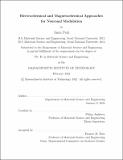| dc.description.abstract | The development of tools to deliver chemical signals to specific neurons can enhance our understanding of chemical signaling in the nervous system and enable chemical therapies for neurological disorders. Existing technologies for chemical neuromodulation, including intracranial injection of chemicals through an implanted cannula, 1) do not apply in the case of transient and unstable chemical species and 2) require tethering of animal subjects to external hardware, which can limit the study of freely-behaving subjects. By employing nanomaterials chemistry, electrochemistry, and magnetism, this thesis seeks to develop in vivo chemical delivery systems with unprecedented capabilities. First, we design an electrochemical strategy that enables in situ synthesis and delivery of unstable chemical signals to targeted neuronal circuits with nanoscale electrocatalysts, biocompatible precursors, and electric fields. This electrochemical system is implemented in an implantable probe allowing for the investigation of neurophysiological processes mediated by unstable chemical species, such as nitric oxide and carbon monoxide, in the mouse brain. The second focus of this thesis is to design a magnetochemical system for wireless delivery and control of chemical signals without tethered hardware. By designing nanotransducers or molecular radicals capable of converting non-invasive magnetic field stimuli into chemical signals, such as protons and flavin cofactors, we remotely modulate activity of specific neurons and chemical signal-mediated behaviors in the mouse. | |
